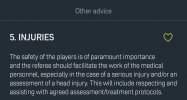A what would you do scenario.
A player develops a spontaneous nosebleed - that is not caused by any action by a teammate or opponent nor the ball - while the ball is in play.
They advise you of this. You acknowledge it and then…. What next?
1: Stop play for a “head injury” and restart with a dropped ball to the team in possession?
2: Advise the player to leave the field by the nearest route and get treatment, and check them and their kit for blood before they return to the field?
3: Something else.
I had this exact incident this Sunday. Before I go into what I did, I’m curious as to other opinions.
A player develops a spontaneous nosebleed - that is not caused by any action by a teammate or opponent nor the ball - while the ball is in play.
They advise you of this. You acknowledge it and then…. What next?
1: Stop play for a “head injury” and restart with a dropped ball to the team in possession?
2: Advise the player to leave the field by the nearest route and get treatment, and check them and their kit for blood before they return to the field?
3: Something else.
I had this exact incident this Sunday. Before I go into what I did, I’m curious as to other opinions.



